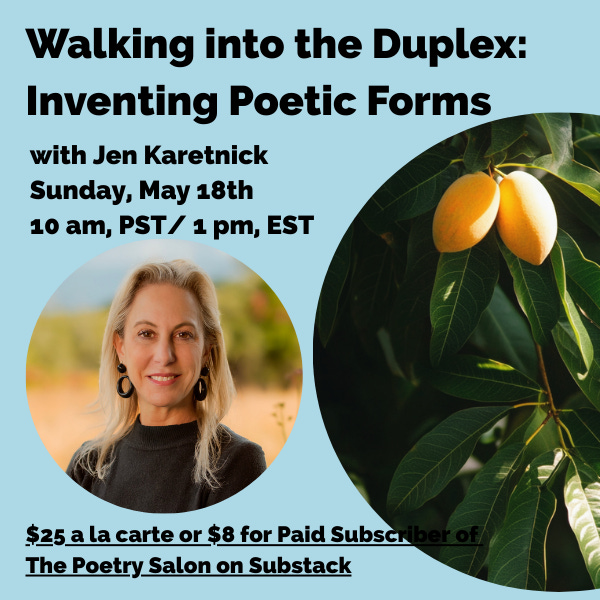A Strange Ritual That Helps Me Decide Where to Submit My Work
Plus, link to our submission and co-promotion group this Sunday

I have an odd superstition about getting published.
I believe that the real goal of writing and sharing our work is not just to get fame and fortune, but rather to help us get connected to our authentic “tribe.” I have a belief that whoever gets published alongside me in a journal or anthology is someone I’m supposed to know - or their poem is one I’m supposed to read.
Let me tell you about my submission ritual.
I therefor believe that every time I get a piece published, I need to read the full journal I’m published in, and if I don’t I believe the poetry gods punish me by refusing to give me any more acceptances until I do! Therefor, when I get a piece published, I make time to do this specific ritual that helps me not only make new poetry friends, but also find my next submission target.
Join me at our Submission Support and Co-Promotion Group today at 10 am, PST/ 1 pm, EST, and I’ll tell you all about it. Paid subscribers will see the link to this group and the ritual at the bottom of this post.
Here are the other events happening this month at The Poetry Salon
Register for the reading here.
How to Survive
Joseph Fasano
Love the small things of the earth.
The dust. The dark rain in the lemon trees.
The sound of moonflowers opening
at evening. Love them
even when the sky is burning,
even when a mother crouches with her child
in a dark room, wetting his lips
with a small glass of water. Love them
quietly, quietly but ferociously,
their hearts in them like flocks
the wind has furled.
And then, in the spring, if the world
has survived, walk out
with your gift that you have practiced,
your fresh gift that has ripened in secret;
lie down in the long, soft grass of summer
and wait for love, wait for it
to find you,
and when it lays its hand at last
upon your shoulder, open
to all that is about to happen;
rise up and walk off into the lemon trees
and live awhile, live awhile
with someone—their eyes, their scent, their curls—
and when love departs, when love
is done and fallen, stand there
in the coming winds of autumn
and turn back to the small things
that have been with you—
buttons, apples, chapters—
and then, because you've practiced this
forever, because you are ready now
for the hardest task of all of them,
lay your hand on the changed face in the mirror
and look at it—
its wounds, its crimes, its changes—
and tell yourself what you see
deserves your mercy—that face, that name, that stranger—
and place your palms on that one life in the mirror
and open to the whole of it, the whole of it,
and love it like the last chance of the world.
Horizon
Kika Dorsey
They say the closer you come to something, the further away it can seem. As if it’s all a horizon. As if the horizon could ever be your lasso, your tightrope spanning past and future, your thread to sew closed what tore.
I’ve been so near to my father’s death that my eyes blurred with more than tears. I’ve been so far away from my children’s birth that they disappeared like March fog when the sun buckles down and does its work of rising from a line I called my life, a line I could never trace. I’ve traveled so far that nothing has looked familiar—not the white marble statues of gods, the banyan trees, the dancing Lipizzaner, the cobblestoned streets, the cock fights in jungles, the foreign seas.
Now I am home and what is close to me presses against my legs, wraps its arms around my waist. I’ve learned that you can never know what lies behind its mystery—a day lost in the woods, a dream of galloping horses, a fire built with twigs, a funeral, a birth—everything so near it has become their flesh, their journey toward a horizon forever receding.
Join us for these events in May
It’s challenging to put your work “out there.” With so many places accepting submissions, how do you know what presses are right for you? And when you get your work published, how do you share about it on social media without seeming too bragadocious? In this fun and supportive group we will share both moral and practical support. Together we will share poems, “likes,” “hearts,” and ideas about where to submit new work.
Walking into the Duplex: Inventing Poetic Forms
Have you always wanted to invent your own poetic form but don’t know where to start? The duplex, the golden shovel, the sonnenizio, and the American sentence acrostic are all forms invented by contemporary living poets. In this workshop, we'll break down the process of formal invention and explore the process behind the product. Participants will leave with four poem drafts as we try our hands at all of them.
Keep reading with a 7-day free trial
Subscribe to The Poetry Salon with Tresha Faye Haefner and Friends to keep reading this post and get 7 days of free access to the full post archives.







